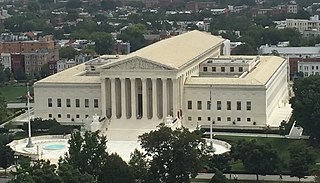Related Research Articles

An appellate court, commonly called a court of appeal(s), appeal court, court of second instance or second instance court, is any court of law that is empowered to hear a case upon appeal from a trial court or other lower tribunal. In much of the world, court systems are divided into at least three levels: the trial court, which initially hears cases and considers factual evidence and testimony relevant to the case; at least one intermediate appellate court; and a supreme court (or court of last resort) which primarily reviews the decisions of the intermediate courts, often on a discretionary basis. A particular court system's supreme court is its highest appellate court. Appellate courts nationwide can operate under varying rules.
In the United States, a state supreme court is the highest court in the state judiciary of a U.S. state. On matters of state law, the judgment of a state supreme court is considered final and binding in both state and federal courts.

The Tennessee Supreme Court is the highest court in the state of Tennessee. The Supreme Court's three buildings are seated in Nashville, Knoxville, and Jackson, Tennessee. The Court is composed of five members: a chief justice, and four justices. As of September 1, 2023, the chief justice is Holly M. Kirby.

The Supreme Court of the State of North Carolina is the state of North Carolina's highest appellate court. Until the creation of the North Carolina Court of Appeals in the 1960s, it was the state's only appellate court. The Supreme Court consists of six associate justices and one chief justice, although the number of justices has varied. The primary function of the Supreme Court is to decide questions of law that have arisen in the lower courts and before state administrative agencies.
The Alaska Court System is the unified, centrally administered, and totally state-funded judicial system for the state of Alaska. The Alaska District Courts are the primary misdemeanor trial courts, the Alaska Superior Courts are the primary felony trial courts, and the Alaska Supreme Court and the Alaska Court of Appeals are the primary appellate courts. The chief justice of the Alaska Supreme Court is the administrative head of the Alaska Court System.
The Alaska Court of Appeals is an intermediate court of appeals for criminal cases in the State of Alaska's judicial department, created in 1980 by the Alaska Legislature as an additional appellate court to lessen the burden on the Alaska Supreme Court. The court of appeals consists of a chief judge and three associate judges, who are all appointed by the governor of Alaska and face judicial retention elections every eight years; the chief judge of the court of appeals is selected from among the four by the chief justice of the supreme court to serve a two-year term.

The Court of Appeals of Virginia, established January 1, 1985, is an intermediate appellate court of 17 judges that hears appeals from decisions of Virginia's circuit courts and the Virginia Workers' Compensation Commission. The Court sits in panels of at least three judges, and sometimes hears cases en banc. Appeals from the Court of Appeals go to the Supreme Court of Virginia.

The Supreme Court of Texas is the court of last resort for civil matters in the U.S. state of Texas. A different court, the Texas Court of Criminal Appeals, is the court of last resort in criminal matters.
The Superior Court is the state court in the U.S. state of New Jersey, with statewide trial and appellate jurisdiction. The New Jersey Constitution of 1947 establishes the power of the New Jersey courts: under Article Six of the State Constitution, "judicial power shall be vested in a Supreme Court, a Superior Court, and other courts of limited jurisdiction." The Superior Court has three divisions: the Law Division which is the main trial court for cases of civil or criminal law, the Chancery Division, which tries equity law cases, and the Appellate Division, which is the intermediate appellate court in New Jersey. "Appeals may be taken to the Appellate Division of the Superior Court from the law and chancery divisions of the Superior Court and in such other causes as may be provided by law." Each division of the Superior Court is divided into various Parts."

The Oklahoma Court System is the judicial system for the U.S. State of Oklahoma. Based in Oklahoma City, the court system is a unified state court system that functions under the Chief Justice of Oklahoma who is its administrator-in-chief.

The government of the State of New Jersey is separated into three distinct branches: legislative, executive, and judicial. The powers of the State of New Jersey are vested by the Constitution of New Jersey, enacted in 1947, in a bicameral state legislature, the Governor, and the state courts, headed the New Jersey Supreme Court. The powers and duties of these branches are further defined by acts of the state legislature, including the creation of executive departments and courts inferior to the Supreme Court.
The Oregon Court of Appeals is the state intermediate appellate court in the US state of Oregon. Part of the Oregon Judicial Department, it has thirteen judges and is located in Salem. Except for death penalty cases, which are reserved to the Oregon Supreme Court, and tax court cases, it has jurisdiction to hear all civil and criminal appeals from Oregon circuit courts, and to review actions of most state administrative agencies. The 13 judges of the court are chosen by the people in statewide nonpartisan elections to six-year terms, and have as their administrative head a Chief Judge appointed from their number by the Chief Justice of the state Supreme Court.
The Tennessee Court of Appeals was created in 1925 by the Tennessee General Assembly as an intermediate appellate court to hear appeals in civil cases from the Tennessee state trial courts. Appeals of judgments made by the Court of Appeals may be made to the Tennessee Supreme Court.
The Georgia Court of Appeals is the intermediate-level appellate court for the U.S. state of Georgia. The court is a single entity with 15 judges. The judges are assigned into five divisions of three judges each, with the assignments changed annually. Cases are randomly assigned to one of the divisions, with the constraint that the number of active cases in each division is kept close to equal. Its courtroom is on the second floor of the Nathan Deal Judicial Center.

The Government of Tennessee is organized under the provisions of the 1870 Constitution of Tennessee, first adopted in 1796. As set forth by the state constitution, administrative influence in Tennessee is divided among three branches of government: executive, legislative, and judicial.
The Kansas Court of Appeals is the intermediate-level statewide appellate court for the U.S. state of Kansas.

The South Carolina Court of Appeals is the intermediate-level appellate court for the state of South Carolina.
The Unified Judicial System of Pennsylvania is the unified state court system of the Commonwealth of Pennsylvania.
The Judiciary of California or the Judicial Branch of California is defined under the California Constitution as holding the judicial power of the state of California which is vested in the Supreme Court, the Courts of Appeal and the Superior Courts. The judiciary has a hierarchical structure with the California Supreme Court at the top, California Courts of Appeal as the primary appellate courts, and the California Superior Courts as the primary trial courts.
The Judiciary of Virginia is defined under the Constitution and law of Virginia and is composed of the Supreme Court of Virginia and subordinate courts, including the Court of Appeals, the Circuit Courts, and the General District Courts. Its administration is headed by the Chief Justice of the Supreme Court, the Judicial Council, the Committee on District Courts, the Judicial Conferences, the Judicial Inquiry and Review Commission, and various other offices and officers.
References
- ↑ "Court of Criminal Appeals Judges". Tennessee Administrative Office of the Courts. Retrieved Feb 13, 2014.
